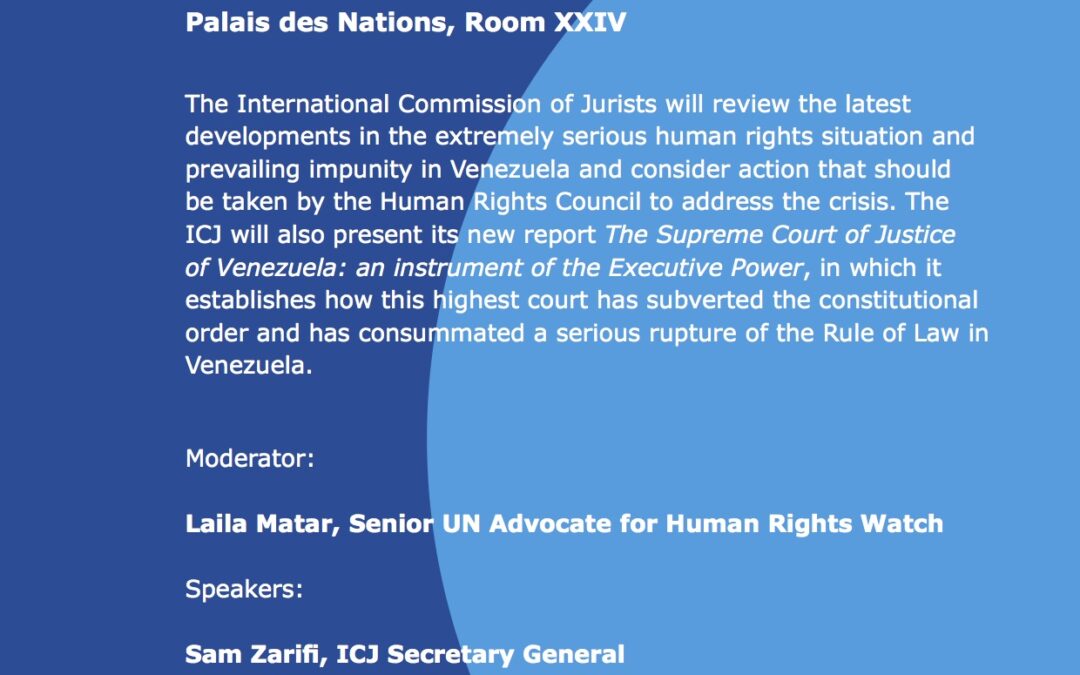
Sep 12, 2017 | Events, Multimedia items, News, Video clips
At a side event to the UN Human Rights Council session, the ICJ reviewed today the latest developments in Venezuela, highlighting the extremely serious human rights situation and prevailing impunity, and discussed action that should be taken by the Human Rights Council to address the crisis.
- Laila Matar, Senior UN Advocate, Human Rights Watch
Speakers:
- Sam Zarifi, ICJ Secretary General
- Carlos Ayala Corao, Venezuelan lawyer, ICJ Commissioner
- Federico Andreu Guzman, ICJ South America Representative
Watch the video:
https://www.facebook.com/ridhglobal/videos/10157079100584616/
For additional recent ICJ reports on Venezuela, click here.
The flyer for this event is available in PDF format by clicking here.
For more information, contact un(a)icj.org
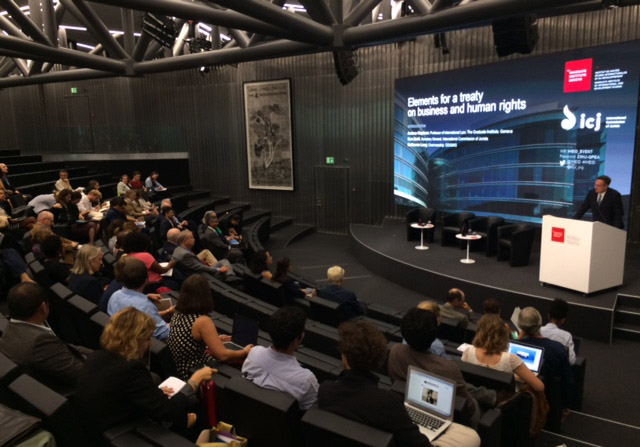
Sep 5, 2017 | Events, News
Today the ICJ and the Graduate Institute of International and Development Studies co-organized a public conference: Elements of a treaty on Business and Human Rights.
In June 2014, the United Nations Human Rights Council established an inter-governmental working group to “elaborate an international legally binding instrument to regulate, in international human rights law, the activities of transnational corporations and other business enterprises”.
The third session of the working group will take place from 23-27 October 2017 at the Palais des Nations.
Today’s event took place at a critical moment to inform the process of elaboration by the working group.
It fosters the exchange of views among international actors, with the aim of creating the basis for consensus on possible contents of a legally binding instrument in the field of business and human rights.
The prospective treaty is expected to contribute to fill some accountability gaps in the international normative framework, in relation to the operations of business enterprises in terms of human rights.
The treaty should also enhance States’ action to ensure effective remedies and reparations for the victims of abuses.
This treaty will be the first in the international human rights law framework to address directly activities of business corporations.
The issue of human rights impacts by business enterprises has reached the top of the international agenda, and several non-treaty instruments have been developed, foremost among them the Guiding Principles on Business and Human Rights.
The process towards a treaty in this field is expected to build on the achievements so far, filling remaining gaps and enhancing rules for and action by states and businesses alike.
For additional information & registration click here
See also the photo of the week on Genève Internationale
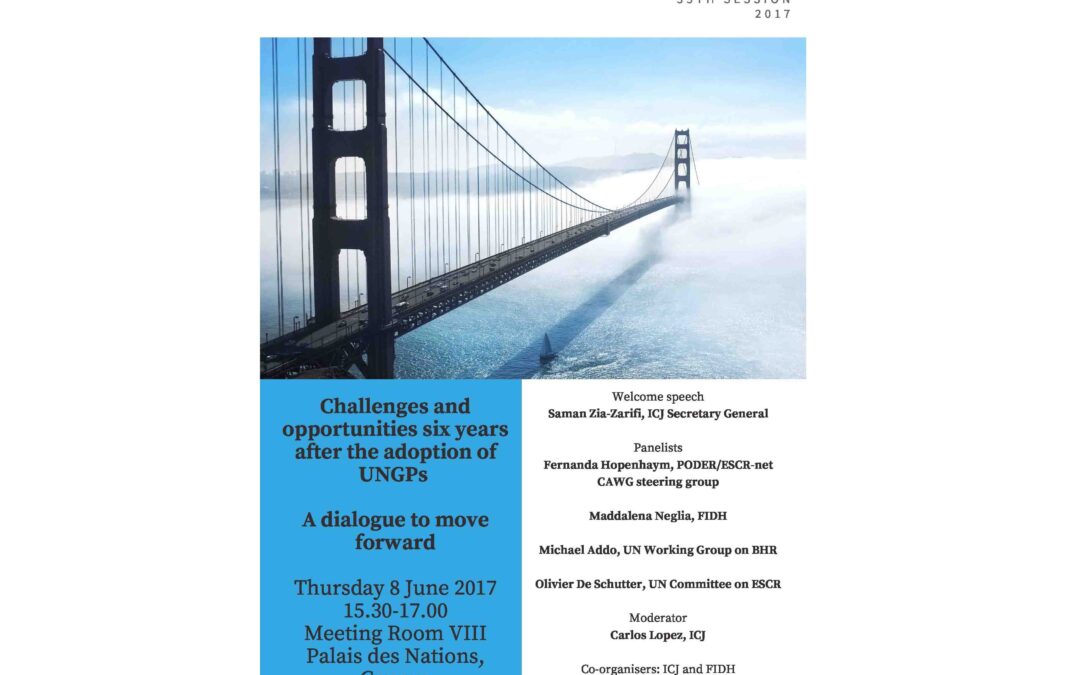
Jun 8, 2017 | Events, News
Today, the ICJ and FIDH are organizing a side event to to the 35th Regular session of the Human Rights Council on business and human rights.
Business responsibility to respect human rights
Challenges and opportunities six years after the adoption of UNGPs
A dialogue to move forward
Thursday 8 June 2017, 15.30-17.00
Meeting Room VIII
Palais des Nations, Geneva
After the adoption of the UNGP in 2011, standards on business responsibility to respect human rights and business human rights due diligence have gained prominence in the global debate on business accountability.
Many companies claim to comply with the UNGP by performing a human rights due diligence including across their global supply chain.
Several initiatives have emerged at regional and national level to promote companies’ due diligence processes, including the EU Directive on non-financial reporting, the UK Modern Slavery Act, the French law on company devoir de vigilance.
Despite the progress, serious human rights abuses still occur in both developing and developed countries.
The ability of companies to identify, monitor and prevent negative human rights impacts in their operations and relationships is still weak and the access to effective remedy remains difficult if not impossible.
This is an opportune moment to take stock of the progresses made to date and the challenges ahead in order to create a level playing field that will effectively promote the respect of human rights in business global operations.
Welcome speech
Saman Zia-Zarifi, ICJ Secretary General
Moderator
Carlos Lopez, ICJ
Panelists
Fernanda Hopenhaym, PODER/ESCR-net CAWG steering group
Maddalena Neglia, FIDH
Michael Addo, UN Working Group on BHR
Olivier De Schutter, UN Committee on ESCR/University of Louvain
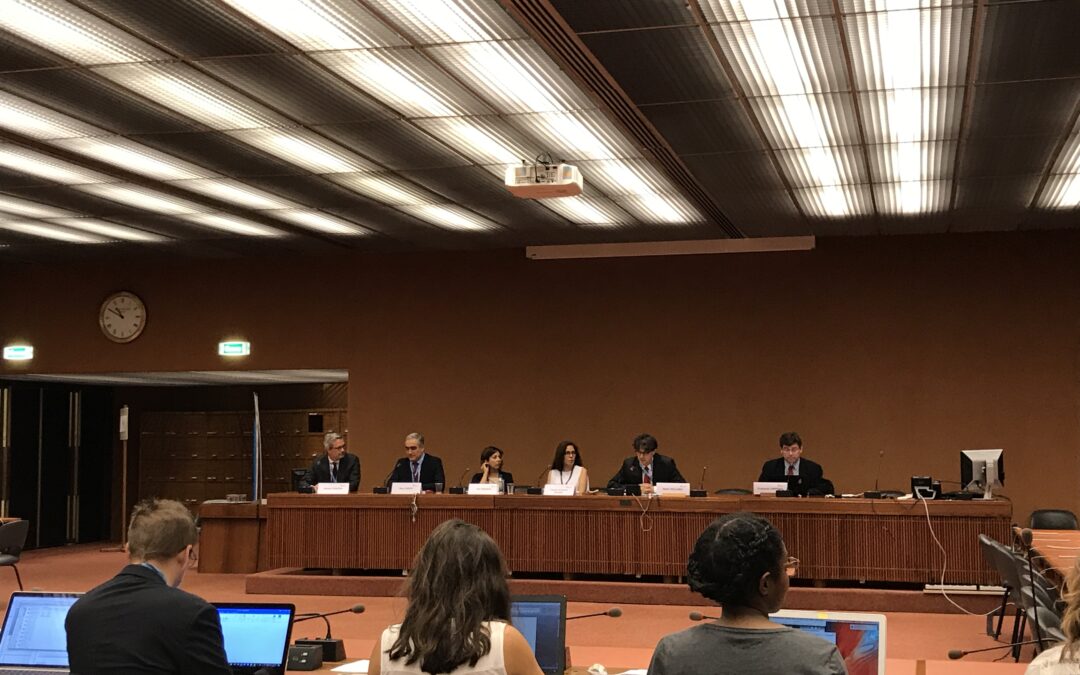
Jun 7, 2017 | Events, News
The ICJ organised a panel discussion on 8 June 2017, on the role of judges and lawyers in relation to refugees and migrants, at a side event to the 35th session of the UN Human Rights Council in Geneva.
The Panel was held on the occasion of the publication of ICJ Principles and Commentary on the topic, developed in consultation with judges, lawyers and other expert practitioners from around the world.
The event took place on Thursday, 8 June 2017, from 10:30 to 11:30, in Room XXI of the Palais des Nations, Geneva.
Welcome remarks were delivered by:
- Saman Zia-Zarifi, Secretary General of the ICJ.
- Olivier Coutau, Délégué à la Genève internationale, Republic and Canton of Geneva
Panelists included:
- François Crépeau, UN Special Rapporteur on the human rights of migrants.
- Carole Simone Dahan, Senior Legal Advisor on Judicial Engagement, UNHCR.
- Pia Oberoi, Advisor on Migration and Human Rights, OHCHR.
The discussion was moderated by Matt Pollard, ICJ Senior Legal Adviser.
At the event, each of the panelists emphasised the importance of access to independence courts and lawyers for securing the rights of refugees and migrants, and highlighted the importance and utlity of the ICJ Principles in this regard.
More background on the ICJ Principles and Commentary is available by clicking here.
For more information, email un(a)icj.org
A flyer for the event may be downloaded in PDF format here: Refugees-Migrants-ICJ-Event-HRC35-June2017
The consultations, development and publication of the ICJ Principles were made possible with the financial support of the Republic and Canton of Geneva, for which the ICJ is grateful.
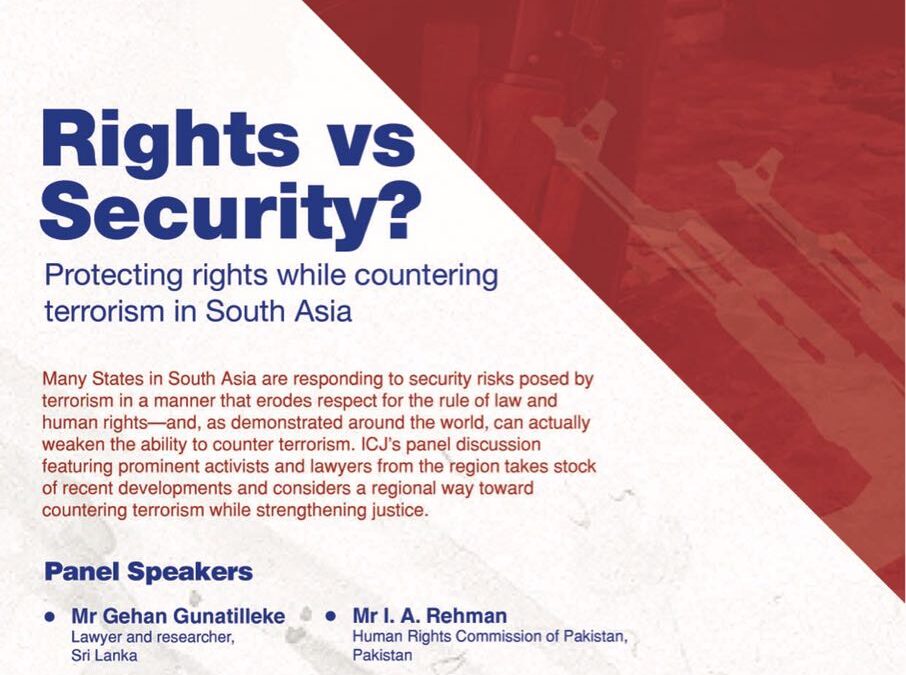
Mar 13, 2017 | Events, News
The ICJ and the Human Rights Commission of Pakistan are convening a side event at the UN Human Rights Council, entitled “Rights vs Security? Protecting human rights while countering terrorism in South Asia”.
The event takes place 15 March 2017, 12:00-13:00, Palais des Nations, Room XXI
Many States in South Asia are responding to security risks posed by terrorism in a manner that erodes respect for the rule of law and human rights—and, as demonstrated around the world, can actually weaken the ability to counter terrorism. ICJ’s panel discussion featuring prominent activists and lawyers from the region takes stock of recent developments and considers a regional way toward countering terrorism while strengthening justice.
Panelists:
Mr I. A. Rehman: Human Rights Commission of Pakistan (Pakistan)
Mr Adilur Rahman Khan: Odhikar (Bangladesh)
Mr Gehan Gunatilleke: Lawyer and researcher (Sri Lanka)
Ms Sanhita Ambast: Human rights lawyer (India)
Moderator:
Mr Massimo Frigo: International Commission of Jurists
A flyer may be downloaded here.
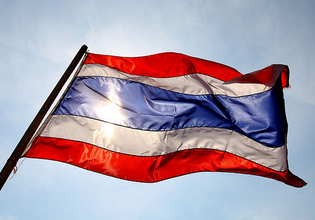
Mar 12, 2017 | Events, News
A side event to the UN Human Rights Council, Tuesday 14 March, 16.00 – 17.00, Palais des Nations room XXI.
TORTURE AND ENFORCED DISAPPEARANCE IN THAILAND
THE STATE RESPONSE
Tuesday 14 March/16.00-17.00
room XXI
Panelists:
Angkhana Neelapaijit, National Human Rights Commissioner and family victim of enforced disappearance
Yuval Ginbar, Amnesty International legal advisor
Moderated by Matt Pollard, ICJ Senior Legal advisor
The event follows the Human Rights Committee’s examination of Thailand’s second periodic report on its implementation of the International Covenant on Civil and Political Rights on 13 and 14 March 2017.
The event will focus on the measures Thailand has taken to implement its international human rights obligations with respect to the prohibition of enforced disappearance, torture and ill-treatment – with a particular focus on the draft Prevention and Suppression of Torture and Enforced Disappearance Act (Draft Law).
Background
Eighty-two cases of enforced or involuntary disappearance in Thailand were reported to the Working Group on Enforced or Involuntary Disappearances between 1980 and 2016. Civil society has also issued several reports containing allegations of torture by security forces, particularly in the restive deep South. These allegations were made against a culture of impunity which pervades Thailand.
In October 2016, after 11 years and three months of investigation, the Department of Special Investigation (‘DSI’) declared the emblematic enforced disappearance case of Somchai Neelapaijit closed, saying no culprits had been found. In January 2017, the DSI further announced it would not investigate the apparent enforced disappearance of Pholachi “Billy” Rakchongcharoen, a Karen minority human rights defender. These cases underscore the difficulties victims face in obtaining justice under the current legal framework in Thailand.
For several years, Thailand has pledged its commitment to ratifying the International Convention on Enforced Disappearance (ICCPED) and passing domestic legislation criminalizing torture and enforced disappearance. In May 2016, the Cabinet approved a Draft Law, which was subsequently transmitted to Thailand’s legislature, the National Legislative Assembly (NLA). However, last month, the NLA announced it would send the Draft Law back to the Cabinet for further consultation, effectively ending the possibility of it being enacted in the foreseeable future.
For further information on recent developments concerning this piece of legislation, please see: https://www.icj.org/thailand-prioritize-the-amendment-and-passage-of-legislation-on-torture-and-enforced-disappearances/.
A flyer for the event may be downloaded here.










